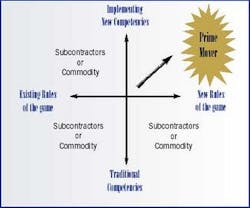Reclaim Your Practice
by Robert Maccario, MBA
You must reclaim your business to take advantage of the current, ever-increasing discontinuity between what consumers want and what their insurance will provide. You must discard your practice's old operational paradigms and mind-sets and instead look to new practice models. In *Leading the Revolution* author Gary Hamel states, "For the first time in history, we can work backward from our imagination rather than forward from the past."
The new practice model concentrates on meeting consumer demands. For the independent practice with a broad view of patient care, professional marketing will influence these demands. This broad view requires dramatic changes in the values of a traditional dental team, prompting a wider range of skills for everyone involved. The practitioner and team utilize advanced materials, technology, and customer service concepts. The entire experience creates a seamless chain of events that meet or exceed the consumer's highest expectations. These critical new ingredients of success start with changing the mind-set of the dental team to evolve an independent business that better serves the dentist, the practice, and patients/guests.
Table 1 illustrates the evolution of a practice and its customers. As your practice evolves into an independent business, what will it take to win in the new game? Whether you develop new competencies or stay with the old, set new rules for the game or play by the old ones, a combination of factors will dictate your success.
The new rules of the game
Table 2 is from Richard Normann's excellent book, Reframing Business. Using this information makes it obvious what you can't do.
If you start out on the lower right corner and attempt to use new rules for the game but have only traditional competencies, your success (if any) will be limited. An example would be marketing yourself as a cosmetic practitioner with a high-quality, professionally developed image but offering only porcelain-fused-to-metal crowns.
If you are in the lower left corner and try to compete with traditional competencies while playing by the old rules, you probably are or will become an insurance-based practice or even a direct insurance company employee. This will happen to many formerly successful practices as the market continues to change. They will fall back to what they did many years ago and become a textbook example of using historical successes as a platform for disaster.
In the upper left corner, the practice is moving ahead with some new competencies but doesn't understand that the old rules no longer apply. A good example of this is trying to perform state-of-the-art dentistry with an insurance-based mentality. A practice like this will be unable to use outside patient financing as a marketing tool and will not have an external marketing presence. They will still have accounts receivable at over 50 percent of one month's average production and will have dramatically eroded profitability, which will limit their capacity to afford continuing education or the latest equipment and up-to-date facility necessary for the practice to stay competitive.
In all the illustrated business models, the practice will either become: 1) A supplier to the insurance company or a direct employee of the insurance company, or 2) simply cease to exist.
The prime mover, in the upper right corner, will thrive, and is the only model that can take advantage of the growing discontinuity be-tween what insurance provides and what consumers want. As Normann states about prime movers and their adoption of new competencies and setting new rules, "The result becomes a shift of focus from a product or service to a value-creating system." A value-creating system goes far beyond a traditional mind-set for dental practices. When you think of your patients as guests and adopt a value-creating system, the possibilities are unlimited and can unlock the full potential of your practice.
New rules demand new competencies
Taking advantage of this tremendous opportunity and choosing the new rules will demand a new set of both clinical and business competencies. The following are some of the old and new rules and their corresponding competencies for you to examine. Which will you choose?
Old rule: Following the insurance company practice profitability model. You can no longer base your future on insurance companies' expectations or their views on fair and equitable profit for a skilled practitioner. Their ideas about acceptable practice profitability and a reasonable return on your effort and risk are vastly different from yours.
It's important to understand that insurance companies base their profitability on the least expensive, professionally acceptable, ethical treatment — not necessarily what is in the patients' best, long-term interest.
New rule: Implementing the independent business profitability model. They think and act as independent business owners. They set their budgets for their practices based on the real cost of business.
• What does it take to attract skilled professionals?
• How many dollars must you allocate to influence your guests' expectations with professionally developed marketing?
• What is the appropriate investment to make in continuing education, new technology and the best materials needed to deliver quality care?
• What does it cost to utilize an exceptional dental lab or work with a superior supplier?
Set your fees based on the unique value you deliver — not some insurance company's perception that all crowns are the same. In setting budgets and revenue expectations, don't underestimate your value. You should be compensated at three levels in your practice:
1As a dentist: What would it cost to hire a dentist with your clinical skills and experience? You should not accept anything less.
2As a president of a healthcare company: It is your job as president to allocate resources, people, time, and money to deliver the highest quality of care. What would an outside business pay you to run a business like yours? When the rest of the team goes home, are you still there figuring out the marketing plan? Are you still there calculating the cost of new equipment? You deserve to be paid for your efforts — just as any other health care firm's president.
3As a stockholder: You have a significant investment in professional training and your business. Your name is on the line with the bank, so you are at risk. As a stockholder in your organization, you deserve a fair return on your investment every year.
Old rule: The office manager. In the past, the office manager came up from the ranks to contribute to running the business. Many of their skills were garnered from their experience of how other practices were successful — not necessarily solid business skills. Some were simply thrust into a management position without any training. Others were given the title of manager, but in name only: Their duties were still limited to being a "glorified receptionist."
New rule: The vice-president of operations. The title is not as important as acquiring the skills. Many office managers are skilled and respected for their contributions to a practice's success, but it is time to go to the next level. Integrate their dedication and years of experience with new skills to move into the independent business model. They need to develop hard-core business skills, which will give them a new direction in their career.
Concurrently, it is time to recruit new management professionals into dental practices, injecting new viewpoints and experiences from other real-world, independent business models. The well-respected veteran of dentistry with solid business skills, or the experienced management professional (whose experience may be outside of dentistry) can, with support from veterans in the field, morph into a vice-president of operations, in either an administratively or clinical capacity. When the president (dentist) is in his or her clinical role, focusing on the care of the patient/guest, he or she should feel confident that the business is still on course. Fewer distractions for the president means an elevated level of care for patients/guests. This evolving business professional needs the skills and confidence to work with a marketing company, bank, consultant, and accountant, but, most importantly, he or she must develop the skills of the other personnel.
Consistent with this new rule is the number of staff: The future will be based not on the quantity of staff, but on the quality. Bring into your practice only people who have the capacity to produce. As the president, do not dilute your time working with marginal players. Instead, direct all of your efforts and energy toward people who can take you into the future. Currently, there is a core group in dentistry proving the worth of this position, running businesses and providing guests with services at the same level or higher as a practice's clinical care.
Old rule: Insurance-based referrals. As long as you have insurance in your practice, insurance companies will consider patients as their subscribers. In this model, resolve yourself to listening to the patient say, "I only want to do what insurance covers" and feeling the impact it can have on their care and your practice. The insurance company is setting the expectations of their customers, not yours. Resolve yourself to sending statements, having an excess accounts receivable and a significantly eroded profitability.
New rule: Develop your "brand" image. Move to strongly influence your patients'/guests' expectations of the practice of the future. By raising those expectations, you strongly attract the type of patient who will appreciate the quality of care you provide. Create public awareness that quality of care goes beyond insurance coverage. Develop a well-thought-out marketing program consistent with your budgeting process that highlights your brand - not insurance.
The practice of the future must anticipate the acceleration of competition within the field of dentistry and realize that the place for homegrown marketing has been left far behind. Establish a relationship with a professional marketing company, one that can position your practice consistent with the patient/guest experience you deliver. Your vice-president of operations should have the skills to orchestrate this relationship and be able to guide the process so you earn the best return on your investment.
Evolving into a successful business
By adopting the new practice model and leaving the old model behind, you will evolve into an independent business capable of meeting consumer demands that other dental practices cannot. The increasing skills of you and your team will keep you on the cutting edge of all areas — customer service, technology, and materials — which will exceed your customer's expectations as well as reinforce your brand identity. These positive changes will improve not only your life as a professional, but that of your team and your patients/guests, while at the same time allowing you to reclaim your practice and recapture your future. What could be better?



